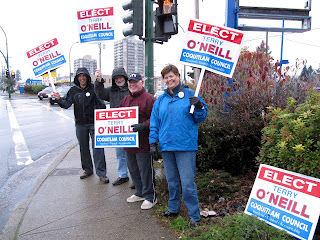I'll explain more about the idea later. First, some background. Only 17,961 of 82,839 eligible voters cast ballots in last fall's election in Coquitlam. That's a turnout rate of just 21.7% .
No one knows exactly why the turnout is so low. Some optimists think it's because people are generally satisfied with the way civic affairs are being managed -- either that, or they don't think civic affairs are important enough to warrant the effort necessary to inform themselves and then cast a ballot.
Most analysts and experts are concerned about the lack of engagement. Of late, some have suggested that the province allow municipalities to make voting easier by opening up the process to on-line balloting. I don't think this is a good idea, though.
First, it would open the system to abuse. We seem to hear about a new computer virus every week or so these days. I think hackers would have a field day if elections went on-line.
 |
| Traditional way of encouraging voter turnout. |
Maclean's magazine reported in its April 16 edition that, after the University of Western Ontario's alma mater's student council set up a on-line voting system, a Western alumnus hacked into the action and briefly changed a candidate's name to "Justin Bieber's Haircut." And at UBC's Senate election in 2010, 731 votes came from a single IP address.
I also think there should be some effort involved in voting, to better encourage fuller engagement with candidates and issues. Otherwise, you end up with "drive-by voting." Let's not cater to "slack-tivisim."
And that brings me to my motion. The current issue of Atlantic magazine reports on a Michigan study that found that voter turnout increases if people think the names of people who voted will be publicized.
Currently, municipal governments make public a record of all voters who cast ballots for eight weeks after the election. But members of the public are only allowed to view the list in person, and are not allowed to make photocopies.
My motion calls on the provincial government to amend all relevant legislation to allow for the publication, in print or on-line, and distribution of such lists. I can see a municipal government keeping a permanent record on its website, and perhaps even buying a supplement in the local newspaper thanking everyone who voted.
That's positive reinforcement at its best! And, of course, many potential voters would not want to be seen as being off the list, and they'd work to ensure they're on it.
Would people read such a list? Of course. Just think of how often you've scanned the names of the winners of the latest hospital lottery or participants in the Sun Run.
The biggest objection I've heard to my idea is that it would infringe on voter privacy or the secret ballot. I don't agree. The list would not say how the person voted. And, as stated above, there's already no absolute privacy, because the list is made public for eight weeks.
We'll be discussing my motion (seconded by Councillor Linda Reimer) at the month's end council meeting.
What an odd practice it is to publish the names of voters. Or so it would seem, for I've never heard of it; how has this escaped my attention? Could it be an assumption on my part that such vestigial practice had been largely eliminated? After all, we no longer pillory the peccant in the public square, at least not literally.
ReplyDeleteIt's shaming the person who does not take the time to vote that you really have mind, is it not? The social control of the traditional community?
I think -- my educated guess is -- that the list was maintained as an aid to the policing of the vote, to allow concerned citizens the opportunity to identify the casting of ballots by persons known to be unqualified to do so. The availability of the list for a limited period after balloting seems to fit with this purpose.
That I have voted, or not, is personal information that, in my opinion, should not be disclosed without my explicit authorization. I'm going to guess that the F.I.P.P.A. commissioner would agree.